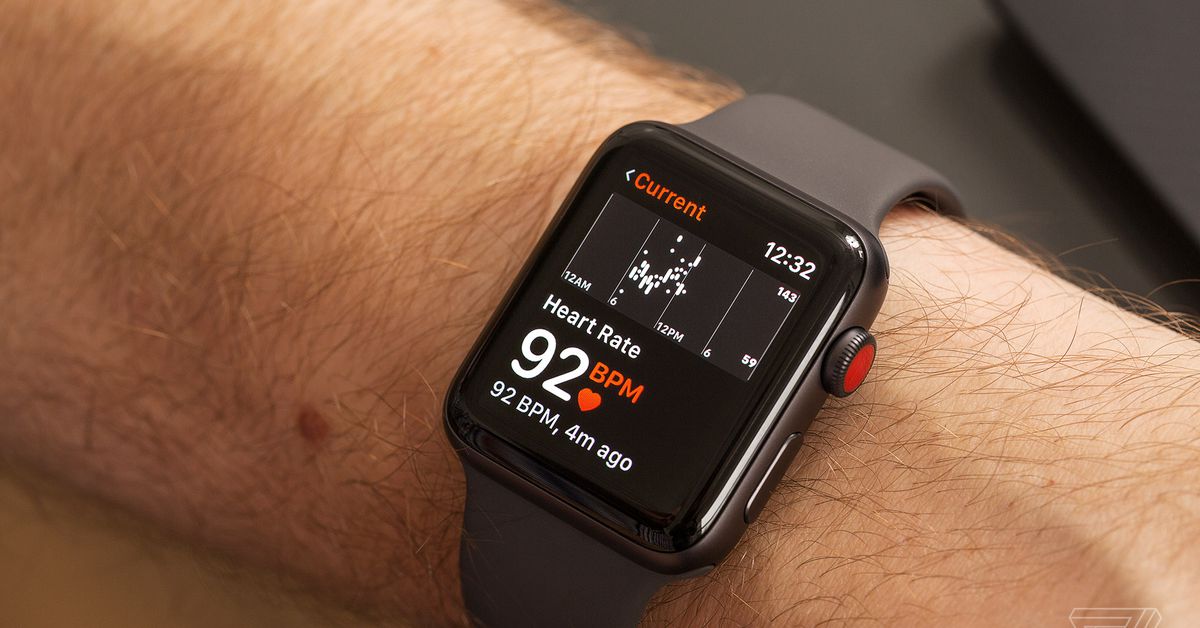Apple Watch, Fitbit users with heart conditions get more medical procedures
Source: The Verge added 02nd Jun 2021People with irregular heartbeats who use wearable devices like Apple Watches and Fitbits aren’t overwhelming doctors with worried calls about their hearts, a new study shows. But they are more likely to be treated with a heart procedure called an ablation, the analysis found.
The small study is one of the first to show how people with existing heart problems use wearables. Devices like the Apple Watch have a heart-monitoring feature that can alert users if they have an irregular pulse. Technically, those features on the Apple Watch are only authorized by the Food and Drug Administration (FDA) for people who don’t have underlying heart conditions. But people with heart conditions, including a type of abnormal heart rhythm called atrial fibrillation, are still able to buy the watch and use those same features.
Cardiologists regularly see patients who have been diagnosed with atrial fibrillation bring in data from an Apple Watch or Fitbit, says study author Libo Wang, a cardiology fellow at the University of Utah School of Medicine. “There are a good amount of patients who are using these wearables outside of the FDA cleared indication,” he says. “That was sort of the motivation to start, not raising the alarm, but raising questions.”
When companies like Apple ask the FDA to authorize a medical device, most of the focus is on making sure that the device does what it promises it can do — without producing too many false positives or negatives. There’s less focus on what users and doctors do with the information. That’s what researchers are studying now, and this new study took an early look at what wearables can mean for people with atrial fibrillation.
The study looked at 125 people with atrial fibrillation who visited University of Utah Health during a 90-day period and who mentioned using a wearable including an Apple Watch or a Fitbit. The team compared them to a group of 500 people with the same condition who didn’t use a wearable but had similar characteristics — including age, socioeconomic status, and the amount of times they typically went to see a doctor.
“The people who were wearing wearables didn’t necessarily call into the office more,” Wang says. That was a welcome surprise, he says: many doctors were worried that they’d get more calls from worried patients who had on a device like an Apple Watch.
Over the 90 days, the group using wearables had a similar average pulse rate as the group that did not — indicating that they ended up with around the same average heart health. But people with wearables did have more medical procedures done during those three months. Specifically, this group was more likely to have an ablation, a type of procedure that creates scars in the heart to restore a normal heartbeat.
The study is small, and just looks at patient visits from one hospital. It also can’t answer the chicken-or-egg question: it’s not clear from this study if the people who wore wearables and had ablations actually had more severe symptoms than the control group and needed the treatment, or if the wearables nudged them to see a doctor prematurely.
It may be that people with heart conditions who decide to buy an Apple Watch do it because they’re feeling more symptoms and want a good way to flag that to a doctor, Wang says. “That may be appropriate, and they may be benefiting from the ‘extra’ ablation.” Alternatively, patients could see their watch flagging an abnormal heartbeat and worry that their atrial fibrillation is getting worse — even when it isn’t. “That may be a waste of time and risk to the patient,” he says.
Earlier research found that the Apple Watch’s heart feature led to unnecessary doctor’s visits for people who didn’t have an underlying heart condition. Only 10 percent of people who visited their doctor after getting an alert from their watch went on to get a new cardiac diagnosis, one study found.
There’s more data on wearables in people without underlying conditions than people with underlying conditions because that’s the group the Apple Watch’s heart monitor was originally tested on. But cardiologists need more information about what the devices mean for people with atrial fibrillation, Wang says — these patients are already using them, and some doctors are even encouraging patients to wear one. He hopes further research can offer more conclusive answers. “We need more clarification.”
brands: Apple First Fitbit It New Office One Pulse Team WAS media: 'The Verge' keywords: Apple
Related posts
Notice: Undefined variable: all_related in /var/www/vhosts/rondea.com/httpdocs/wp-content/themes/rondea-2-0/single-article.php on line 88
Notice: Undefined variable: all_related in /var/www/vhosts/rondea.com/httpdocs/wp-content/themes/rondea-2-0/single-article.php on line 88
Related Products
Notice: Undefined variable: all_related in /var/www/vhosts/rondea.com/httpdocs/wp-content/themes/rondea-2-0/single-article.php on line 91
Warning: Invalid argument supplied for foreach() in /var/www/vhosts/rondea.com/httpdocs/wp-content/themes/rondea-2-0/single-article.php on line 91
